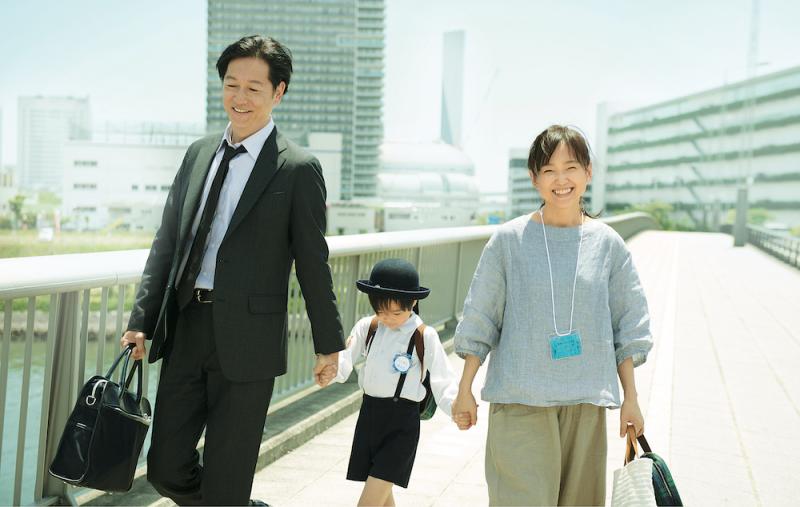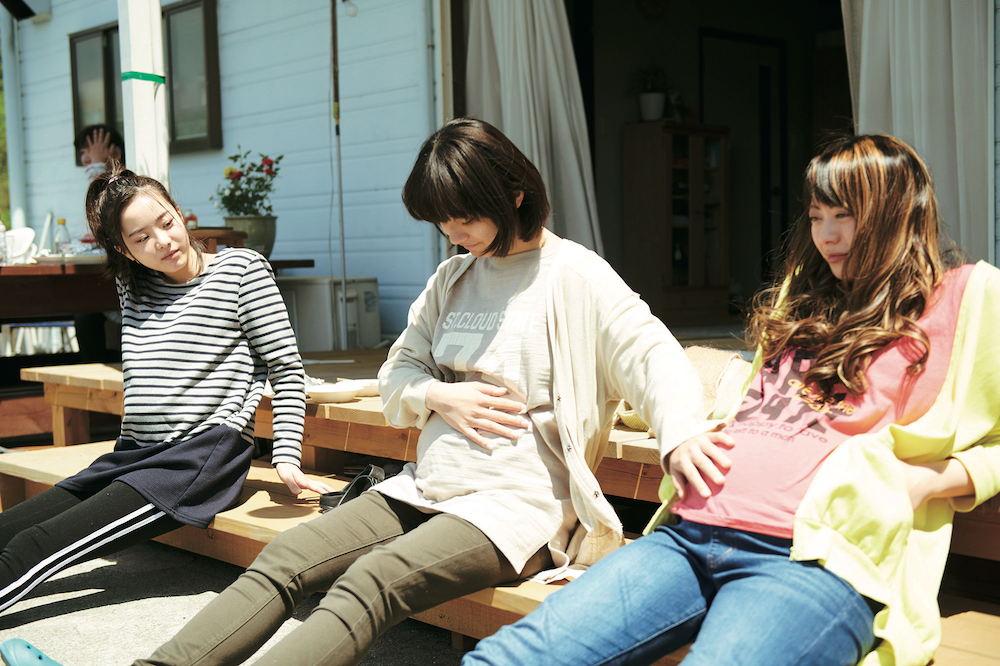True Mothers review - how many people does it take to raise a child? | reviews, news & interviews
True Mothers review - how many people does it take to raise a child?
True Mothers review - how many people does it take to raise a child?
Atmospheric but sentimental: Japanese auteur Naomi Kawase casts her gaze on adoption

On the 30th floor of a Tokyo apartment building, a charming little boy brushes his teeth, watched over by his smiling mother who sings to him gently. He’s full of joy - today his dad’s coming with them on the walk to nursery school. The little family of three walk out together. All seems well – too well - in their comfortable, quiet world.
Prolific Japanese director Naomi Kawase, a Cannes favourite (this is her 32nd film), brings her trademark views of dazzling sunlight seen through trees, sparkling waves lapping and languorous shots of faces to bear in True Mothers, though the story, adapted from a novel by Mizuki Tsujimura, is more straightforward than in some of her other, more mystical works such as Still the Water and Vision.
Lives intertwine, flashbacks meld with the present and we’re kept in suspense about the identity of a key character. It's too long - almost two and a half hours - but it’s a moving story, steeped in atmosphere and with some luminous performances. Satoko Kurihara (Hiromi Nagasaku) and her husband Kiyokazu (Arata Iura), who’s been through painful sperm-extraction procedures without success, adopt Asato (the enchanting Reo Sato) when he is a newborn, from an agency called Baby Baton, run by Mrs Asami (Miyoki Asada), a wise woman with a mission to find the right parents for babies whose mothers can’t raise them.
Asato’s birth mother is Hikari (the brilliant Aju Makita; Shoplifters, After the Storm), a well-brought-up 14-year-old schoolgirl with a neat bob who hadn’t even had her first period before conceiving. Her parents accompany her to the excruciatingly sad hand-over where she hangs her head, sobs and apologetically gives the couple a letter to keep for Asato.
But now, four or five years later, Hikari disturbs the parental idyll by appearing at the couple’s flat, clumsily trying to blackmail them by threatening to reveal Asato’s origins if they don’t pay her. As they’ve already informed him, their friends and school about the adoption, in adherence with the Baby Baton rules, this isn’t much of a threat, though there's still a stigma around adoption in Japan. But is the strange, troubled young woman, whose hair is now blonder and longer, actually Hikari, or is she an imposter?
This traumatic turn of events coincides with a child at school accusing Asato of pushing him off the jungle gym. In an odd parallel this leads to the child’s parents demanding money, which causes as much consternation as Hikari’s reappearance. Is Asato perhaps not as angelic as he looks? But this thread doesn’t go anywhere much.
The second, more gripping, half of the film goes back to the beginning of Hikari’s story: happiness and first love with her classmate Takumi (Taketo Tanaka); her parents’ horror at her pregnancy and the discovery that it’s too late for an abortion; and waiting out the rest of her pregnancy in the selfless Mrs Asami’s low-key sanctuary on a tiny island near Hiroshima.
 Here Hikari (Aju Makita, centre, pictured above) finds peace, chopping vegetables, watching the boats go by and making friends with the other girls, mainly jaded sex workers in their twenties with none of her advantages. “Convenience stores raised me,“ says one. Mrs Asari’s aim is to provide happy memories and make luscious birthday cakes for these lost girls who thought such treats were “an urban myth”. Kawase casts her documentarian’s gaze, as she’s put it (she’s the official film maker for the Tokyo Games) over these women’s fragmented discussions about the unfair system that’s left them stranded.
Here Hikari (Aju Makita, centre, pictured above) finds peace, chopping vegetables, watching the boats go by and making friends with the other girls, mainly jaded sex workers in their twenties with none of her advantages. “Convenience stores raised me,“ says one. Mrs Asari’s aim is to provide happy memories and make luscious birthday cakes for these lost girls who thought such treats were “an urban myth”. Kawase casts her documentarian’s gaze, as she’s put it (she’s the official film maker for the Tokyo Games) over these women’s fragmented discussions about the unfair system that’s left them stranded.
Hiraki’s depth of feeling stands out. “I’ll never forget that we watched the sunset together,” she tells her unborn child. And her inability to go back to a life of school uniform and family meals – the last one ends in a violent fight - is very convincing. “Tell them you’ve had pneumonia,” Hiraki’s mother, more concerned with what other people might think than with her daughter’s trauma, tells her before she goes back to school. Hiraki looks at her with piercing disdain. She's soon trying to make her way alone in the city, delivering newspapers on a bicycle, her T-shirts covered with slogans such as “Delight of the first order”. She may be turning into one of those lost girls.
There are too many sentimental moments, with shots of gauzy curtains swaying in the breeze. Would Asato really remember the blurry face of his Hiroshima mummy, as he calls her? And does the saintly Satoko never raise her voice or get angry? But Hiraki’s subtle performance, full of raw emotion and grit, forms a good contrast to the muted notes of the Kuriharas. And who’s to say, in the end, which of them is the true mother?
rating
Explore topics
Share this article
The future of Arts Journalism
You can stop theartsdesk.com closing!
We urgently need financing to survive. Our fundraising drive has thus far raised £49,000 but we need to reach £100,000 or we will be forced to close. Please contribute here: https://gofund.me/c3f6033d
And if you can forward this information to anyone who might assist, we’d be grateful.

Subscribe to theartsdesk.com
Thank you for continuing to read our work on theartsdesk.com. For unlimited access to every article in its entirety, including our archive of more than 15,000 pieces, we're asking for £5 per month or £40 per year. We feel it's a very good deal, and hope you do too.
To take a subscription now simply click here.
And if you're looking for that extra gift for a friend or family member, why not treat them to a theartsdesk.com gift subscription?
more Film
 Urchin review - superb homeless drama
Frank Dillane gives a star-making turn in Harris Dickinson’s impressive directorial debut
Urchin review - superb homeless drama
Frank Dillane gives a star-making turn in Harris Dickinson’s impressive directorial debut
 Mr Blake at Your Service review - John Malkovich in unlikely role as an English butler
Weird comedy directed by novelist Gilles Legardinier
Mr Blake at Your Service review - John Malkovich in unlikely role as an English butler
Weird comedy directed by novelist Gilles Legardinier
 Don't Let's Go to the Dogs Tonight review - vivid adaptation of a memoir about a Rhodesian childhood
Embeth Davidtz delivers an impressive directing debut and an exceptional child star
Don't Let's Go to the Dogs Tonight review - vivid adaptation of a memoir about a Rhodesian childhood
Embeth Davidtz delivers an impressive directing debut and an exceptional child star
 One Battle After Another review - Paul Thomas Anderson satirises America's culture wars
Leonardo DiCaprio, Teyana Taylor, and Sean Penn star in a rollercoasting political thriller
One Battle After Another review - Paul Thomas Anderson satirises America's culture wars
Leonardo DiCaprio, Teyana Taylor, and Sean Penn star in a rollercoasting political thriller
 Steve review - educator in crisis
Cillian Murphy excels as a troubled headmaster working with delinquent boys
Steve review - educator in crisis
Cillian Murphy excels as a troubled headmaster working with delinquent boys
 Can I get a Witness? review - time to die before you get old
Ann Marie Fleming directs Sandra Oh in dystopian fantasy that fails to ignite
Can I get a Witness? review - time to die before you get old
Ann Marie Fleming directs Sandra Oh in dystopian fantasy that fails to ignite
 Happyend review - the kids are never alright
In this futuristic blackboard jungle everything is a bit too manicured
Happyend review - the kids are never alright
In this futuristic blackboard jungle everything is a bit too manicured
 Robert Redford (1936-2025)
The star was more admired within the screen trade than by the critics
Robert Redford (1936-2025)
The star was more admired within the screen trade than by the critics
 Blu-ray: The Sons of Great Bear
DEFA's first 'Red Western': a revisionist take on colonial expansion
Blu-ray: The Sons of Great Bear
DEFA's first 'Red Western': a revisionist take on colonial expansion
 Spinal Tap II: The End Continues review - comedy rock band fails to revive past glories
Belated satirical sequel runs out of gas
Spinal Tap II: The End Continues review - comedy rock band fails to revive past glories
Belated satirical sequel runs out of gas

Add comment